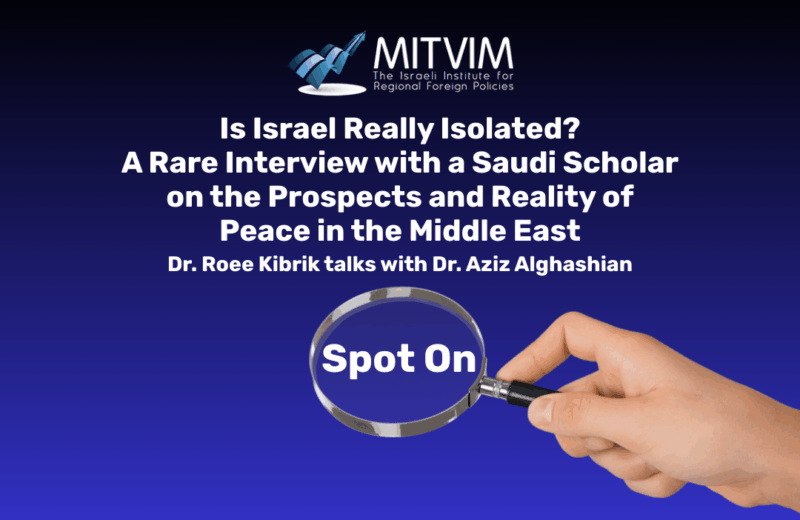 All Publications
/ Saudi Arabia
All Publications
/ Saudi Arabia
Dr. Aziz Alghashian on Saudi Arabia, the Regional Crisis, and the Conditions for Progress
Based on a conversation conducted by Dr. Roee Kibrik ahead of Mitvim’s Annual “Building Hope” Conference.
In a timely and candid conversation ahead of Mitvim’s annual Building Hope conference, Dr. Roee Kibrik, Director of Research at the Mitvim Institute, spoke with Dr. Aziz Alghashian, Senior Policy Fellow at Mitvim and non-resident fellow at the Arab Gulf State Institute in Washington. The discussion unfolded during a moment of extreme regional turbulence, at a time when – as Dr. Alghashian put it – “a nightmare scenario after nightmare scenario is happening time and again.”
A Region Living Through “Nightmare Scenarios”
Reflecting on the developments of the past year, Dr. Alghashian described an atmosphere of unprecedented unpredictability: “Now it’s time to expect the unexpected… nightmare scenarios are actually very likely to happen.”
He pointed to the strikes in Iran, attacks on multiple capitals, the crisis in Lebanon, the war in Sudan, and instability in Yemen as elements of a single regional picture: “This situation… is going to find itself in this web of instability in the region.”
For Gulf states – and especially Saudi Arabia – the danger is acute: “For countries in the Gulf, especially Saudi Arabia, this is a security situation that they really, really, really do not want to find themselves in.”
Beyond geopolitics, he emphasized the emotional injury: “Nobody could go through the trauma that Palestinians and Israelis are going through now… and there is a regional trauma.”
How Israel Is Perceived Today
Contrary to widespread claims in Israel, Alghashian rejected the notion that Israel is isolated diplomatically: “I don’t think Israel is that isolated in the region… Abraham Accords are still intact.”
But he highlighted a dramatic shift in public sentiment: “The perception of Israel has changed dramatically… the lowest it’s been for a long time.”
More strikingly, he warned of a shift in threat perception across the region: “After what took place in Iran… then Doha… it significantly changed the perception of Israel… especially for the youth.”
For many young people, he explained: “They said: this is the Israel that we heard about.”
Saudi Arabia’s Conditions – Clear and Non-Negotiable
Pressed by Dr. Kibrik about what Saudi Arabia requires to join reconstruction or stabilization efforts, Alghashian described a consistent position shared with Arab and Muslim partners: “We will be happy to participate… if there is a full Israeli withdrawal.”
He added a second pillar: “There has to be a clear-cut political pathway.”
And a third, crucial component: “The role of the PA… is very, very significant, because it offers legitimacy.”
Saudi Arabia, he explained, cannot be perceived as legitimizing military actions taken by Israel: “They cannot be seen to be entering into a… reconstruction process or contributing to security… with the current situation.”
Saudi Willingness – and the Risk of Losing the Moment
One of the most striking points in the conversation is Saudi Arabia’s unusual readiness to contribute materially and militarily: “There are few precedents where Saudi has sent forces outside its borders… but they were willing to engage.”
This level of willingness, he warned, is rare – and the region risks wasting it: “Here’s an opportunity to miss an opportunity.”
Gaza cannot Be Addressed Without the West Bank
Alghashian stressed repeatedly that any stabilization effort must integrate both arenas: “We need a… reconstruction not only of Gaza, but really a reconstruction of the West Bank.”
When Dr. Kibrik summarized this insight – “All eyes on Gaza… we must go through the West Bank?” – Alghashian answered clearly:
“Yes.”
The Path Forward – Linking Global and Regional Initiatives
Alghashian proposed bridging the U.S.-backed Trump plan with the New York Declaration:“We want to create… one complements the other.”
The Trump plan offers American commitment; the New York Declaration provides political clarity. Together, he argued, they offer a viable diplomatic horizon.
A Personal Message to Israelis
In the closing moments, Alghashian shifted from policy to people: “I’ve realized in the past year or two how little we know about each other. And that has to change.”
He emphasized a shared humanity: “All our blood is red.”
And a shared regional destiny: “We all have to be speaking to each other, together, collectively.”
Despite his caution, he ended with a note of hope: “I wouldn’t be in this game if I didn’t believe in the tangibility of peace.”
Dr. Kibrik concluded by acknowledging the significance of Alghashian’s participation: “You put your words into deeds… It’s essential and meaningful for us.”


